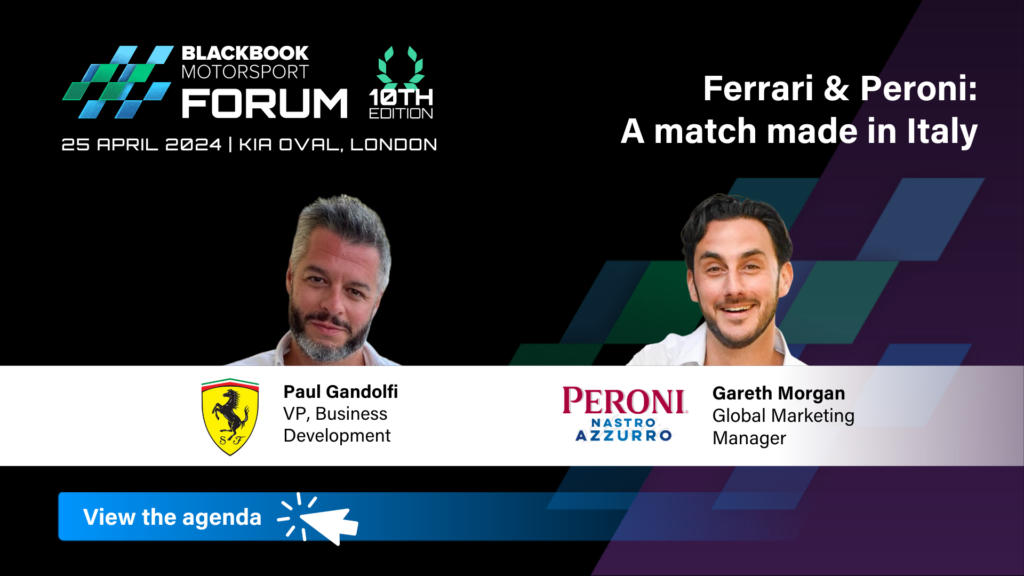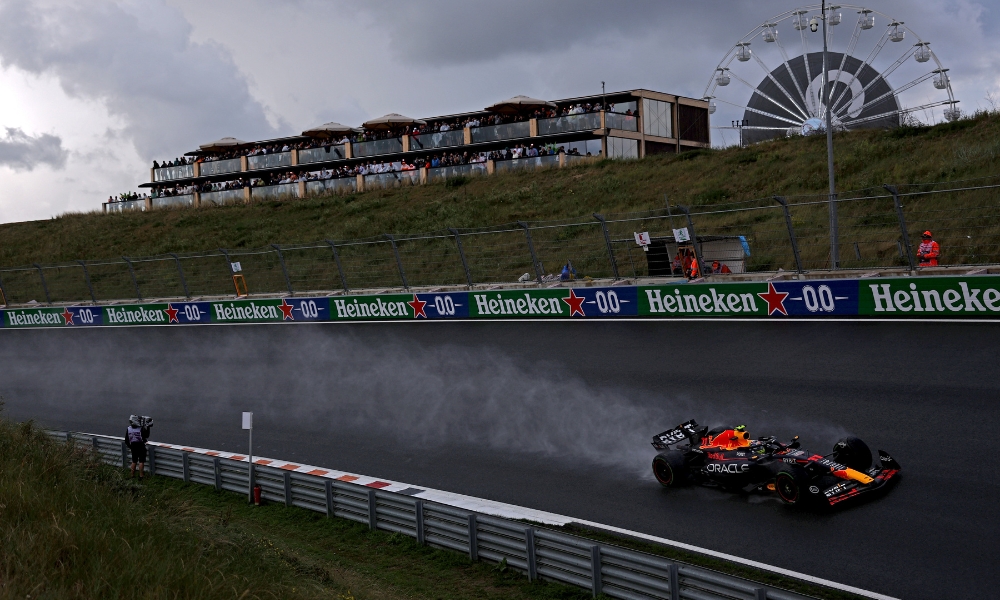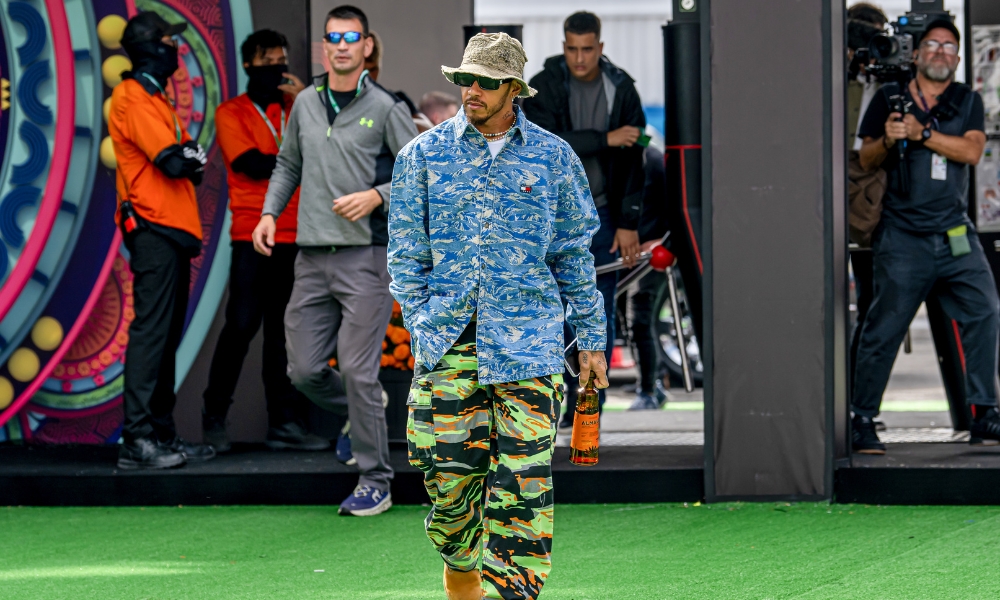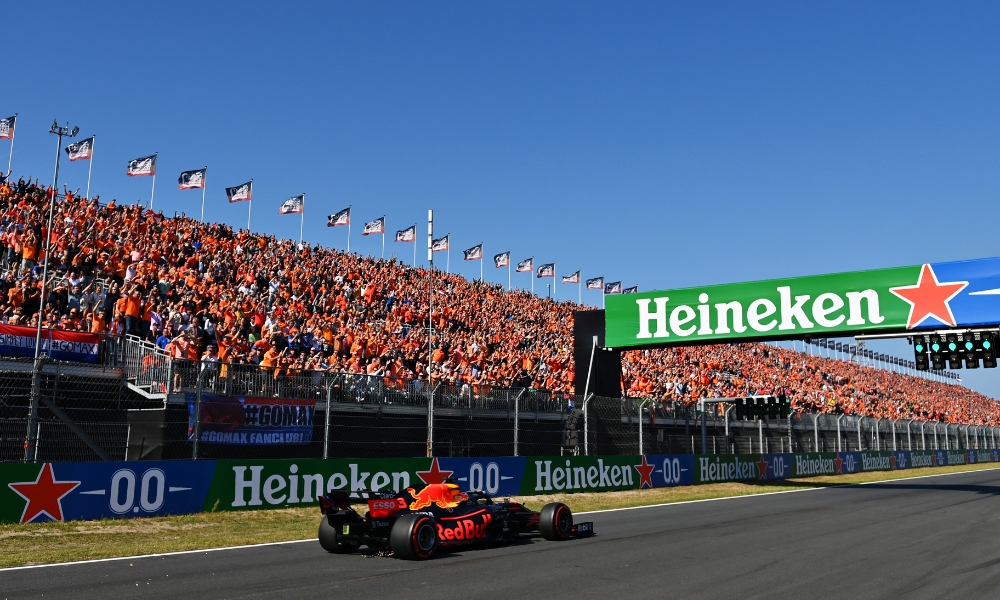On the surface, a combination of Formula One and beer companies makes little sense as a sponsorship opportunity.
The promotion of alcohol in the world’s premier motorsport series is certainly ironic with the dangers surrounding drink-driving. Yet Formula One is increasingly seen as an applicable platform for alcohol brands, with the championship even boasting an official beer partner.
Dutch manufacturer Heineken has held this global sponsorship position since 2016, most recently signing a five-year contract extension in 2023 worth US$250 million, according to sponsorship analytics platform Luscid.
While the link may have appeared inappropriate initially, Heineken has used the platform to promote its ‘When You Drive, Never Drink’ campaign. After all, a 2018 study by BMC Public Health found that ‘alcohol content occurred in all of the races shown and in 41 per cent of all advertisement breaks’.
Heineken’s link with Formula One has also taken on an increased relevance with the rise of Max Verstappen. The Dutch driver and reigning world champion is a brand ambassador for the company, with his ‘Player 0.0’ campaign promoting the brand’s alcohol-free alternative through a virtual racing experience.
Lovely day at the Player 0.0 finals together with @Heineken 🙌 pic.twitter.com/nLGlUFmAjn
— Max Verstappen (@Max33Verstappen) December 6, 2023
This is just one example of how alcohol companies have adapted to change their messaging around promoting their products and encourage drinking in moderation, but also to retain their sponsorship platform in Formula One without regulations.
Such a shift has paid dividends. At the start of this season, Asahi Europe and International and Estrella Galicia signed new sponsorship deals with Ferrari and McLaren, respectively. These recent deals for the Peroni Nastro Azzurro 0,0% and Estrella Galicia 0,0% brands have brought the topic of alcohol in Formula One to the forefront once more.
Austin Schneider, director of business development at Sport Dimensions, and Aled Rees, managing director – strategy and insights at CSM Sport and Entertainment, analyse the trends in this particular sponsorship category.

Why do beer companies see Formula One as the right market to promote their alcohol-free brands?
Aled Rees (AR): We know that Formula One continues to be a huge draw to beer companies, but there challenges around restrictions in the new markets the series now races, such as the Middle East and the Netherlands.
Plus, with a magnifying glass on the alcohol category as a whole in sports, the pressure and governance of the category will only intensify if brands don’t proactively pursue zero-alcohol or responsibly-led campaigns.
Furthermore, with the audience skewing younger and their consumption habits changing, they’re primed for no/low-alcohol brands.

Heineken receives considerable visibility through Formula One, especially at its home race, but advertising alcohol in the Netherlands is illegal between the hours of 6am and 9pm
Austin Schneider (AS): I think Formula One is a great venue for brands to extend what they offer, and increasingly there is consumer demand around non-alcoholic options. There is a positive underlying message that you can drink and still be socially engaged without needing to consume alcohol.
Of course, brands need to be culturally respectful to those that don’t drink alcohol, too. There is also the element of consistency and simplicity in the messaging. The brand could lead with the overall message of non-alcoholic brands, but then consider more locally minded activations for different products that suit different cultures.
Is it responsible for alcohol brands to advertise in motorsport?
AS: If done tastefully with the correct messaging around the importance of responsibility, then I think it is a great venue for it. Heineken in particular has done an exceptional job with its messaging, notably the ‘When You Drive, Never Drink’ campaign and content around its alcohol-free product with Nico Rosberg and Max Verstappen.
AR: It’s not a simple yes or no answer, of course, as it is heavily contested by some. There are multiple variables at play but, if the brand campaign, messaging and activities clearly demonstrate and promote responsible consumption, it can be a wholly positive platform. It’s a far more natural home for genuine promotion of zero-percent alcohol over most other sports.
This one’s for you Tifosi!
— PeroniNastroAzzurro (@peroniuk) January 30, 2024
Peroni Nastro Azzurro 0.0% is the proud new partner of Scuderia Ferrari 🏎️
Thanks to the fastest and smoothest duo around for executing the perfect brewery brake in 😉
Salute Tifosi 🍻#TheBrakeIn #SaluteTifosi #PeroniNastroAzzurro #ScuderiaFerrari pic.twitter.com/nzkP7wcOx3
Heineken, Peroni and Estrella Galicia are all notable brands involved in Formula One – can you see more following?
AS: Absolutely. The ones you have mentioned have led the charge and illustrated how it is possible. You would expect spirits and wines to enter the space. You would also expect non-alcoholic alternatives such as sparkling water (like Liquid Death’s activation at the Las Vegas Grand Prix) and other natural drinks be able to make a play.
AR: Singha, Kingfisher, and Michelob (through a regional US deal with Williams) have also had a presence before, not to mention the likes of Fosters and Warsteiner. We would imagine more might follow, but they’d have to have a very distinct partnership narrative and campaign, and activate across multiple channels, to compete with Peroni and Heineken in particular, who both deliver 360 activation year-round.
Go deeper
- Podcast | 2024 season preview: Is Verstappen’s dominance bad for F1’s business?
- ‘How many brands are willing to pay US$60m?’: The business of Formula One title sponsorships in 2023
Lewis Hamilton launched a non-alcoholic tequila and Max Verstappen has his Player 0.0 partnership with Heineken. How important is personal endorsement for brands?
AR: It is increasingly important to generate cut-through in a busy category and develop deeper meaning for fans to inherently want to trial and purchase product themselves. Fans have greater affinity to individual drivers versus teams (Ferrari are the only real exception here), so it’s a logical move to contract drivers as ambassadors too.
AS: Tying superstars like the two above to your product presents the opportunity to illustrate that it is ‘cool’ to choose non-alcoholic options. I think it is important culturally, too. It allows fans who see parts of themselves in the drivers extend into the types of drinks they enjoy. It also illustrates the influence and responsibility drivers have as spokespeople with their audiences, particularly young audiences.

Lewis Hamilton appeared at the 2023 Mexican Grand Prix with a bottle of his alcohol-free ‘Almave’ tequila
Are these types of deals more authentic because they fit with the healthy lifestyles that athletes promote?
AS: Potentially, although there is an argument that non-alcoholic beer isn’t exactly good for you either. It’s just a better alternative in situations where you may need to drive home that night, or something along those lines.
AR: It’s difficult to say that this is the case as the promotions and communications aren’t necessarily on this aspect, but it is logical to assume that this might be the case. Certainly most of the Formula One drivers that I have known don’t tend to consume much alcohol during the season and, therefore, it is quite natural and authentic for them to endorse non-alcoholic products.

Does this suggest Formula One fans are more health-conscious than fans of other sports? Are they more likely to buy/drink non-alcoholic beers?
AR: The evidence that we have seen from our CSM Global Fan Survey suggests that Formula One is the second-most popular global sport amongst non-alcoholic beer drinkers.
Formula One fans also: over-index versus the general population, they are more likely to own personal healthcare tech, and they are more likely to consume health foods and supplements. This is partly a reflection of the fact that they are younger (51 per cent are under the age of 34).
The good news for non-alcoholic beers is that they are more receptive to sports sponsors, and are more likely to be early adopters.
AS: It is hard to say with the health-consciousness component. Like other things with Formula One, there is a premium element at play with the fan. Most of the brands involved in Formula One are premium or luxury in nature – that attracts a certain type of consumer. It does seem like non-alcoholic beer generally skews premium, as you don’t see a lot of the lighter or domestic beers offering this option.
BlackBook Motorsport Forum is back for its 10th anniversary edition. Join us in London this April to navigate the transformation of motorsport and the trends driving the industry forward into the next decade.

